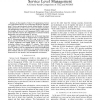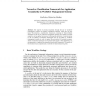6 search results - page 1 / 2 » Definition and Evaluation of Penalty Functions in SLA Manage... |
ICNS
2008
IEEE
13 years 11 months ago
2008
IEEE
The paper presents an analysis of the possibilities of defining penalty functions to be used in SLA management frameworks. As a basis for the analysis, a brief survey of metrics u...
NOMS
2006
IEEE
13 years 10 months ago
2006
IEEE
— This work considers the problem of hosting multiple third-party Internet services in a cost-effective manner so as to maximize a provider’s business objective. For this purpo...
BDIM
2007
IEEE
13 years 11 months ago
2007
IEEE
—In the majority of today’s IT organizations, Service Level Agreements (SLAs) are an important means for underpinning IT service provisioning by clearly defined Quality of Ser...
CAISE
1999
Springer
13 years 9 months ago
1999
Springer
The support of process enactment through the use of workflow management systems has gained considerable attention within the last few years. We develop a classification framework c...
CIKM
2009
Springer
13 years 8 months ago
2009
Springer
The nDCG measure has proven to be a popular measure of retrieval effectiveness utilizing graded relevance judgments. However, a number of different instantiations of nDCG exist, d...


